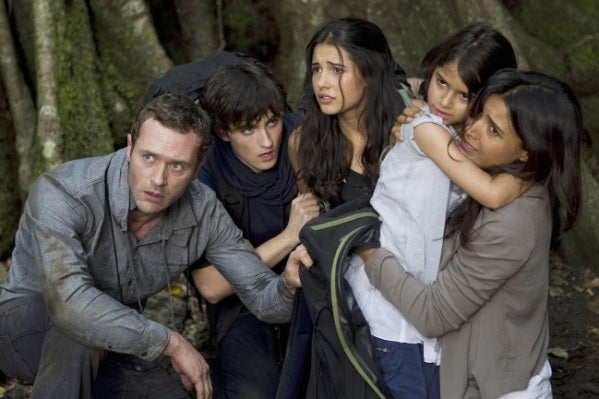"Terra Nova" is extinct — at least on Fox. And while 20th Century Fox Television, the studio behind the troubled Steven Spielberg-produced dinosaur drama, is exploring its options and looking for a new home for the series, it's worth asking in the meantime, "How did a show that promised so much ended up flaming out after just one season?"

Big, loud and attention-getting like the dinosaurs that populated it, "Terra Nova" promised grand things. A sci-fi production, featuring dinosaurs, from Steven "Jurassic Park" Spielberg? Who wouldn't be intrigued at the notion of such a massive vision playing out across the small screen?
But with big expectations come the potential for big disappointment, and before long "Terra Nova" generated what proved to be an insurmountable amount of hype around it.
Executive producer Alex Graves probably didn't help matters any when, at the Television Critics Association winter press tour in January 2011, he told reporters that "Terra Nova" was aiming for a wider audience than "Lost" — one of the biggest, and most cherished, surprise sci-fi hits in recent years.
"'Terra Nova,' more than anything I've done before in my life, is for everybody," Graves told the assembled television critics. "Everyone from my kids to a gamer to my dad will love this show. It's incredible."
Could any show do anything but fall short of that kind of build-up? Moreover, could any show that promises to be everything to everybody really come through on that promise?
When "Terra Nova" finally premiered in September 2011, no doubt many viewers were confused as to what they were supposed to be watching. Was this a family drama? A prehistoric action-adventure series? A sci-fi program?
That confusion could very well stem from the long, ever-evolving path that "Terra Nova" took to the TV screen — it's easy to lose focus when you lay off most of your writing staff, as the series did in November 2010.
The problems that plagued "Terra Nova" go back further than the writers' shakeup, though. Before the series had even shot a single frame, as TheWrap reported in October 2010, the series had experienced a series of misfires, including the departure of writer and director David Fury. Attempts to land Kevin Bacon and Kyle Chandler as the male lead both failed.
The show's upwardly spiraling cost was the biggest wooly mammoth in the prehistoric room, with some estimates saying that the pilot could cost as much as $20 million.
"It’s a debacle. The cost of the show is kind of a moving target,” one individual close to the project told TheWrap. “They’re down in Australia building sets like it's going to be the next ‘Jurassic Park.’”
(Both Fox and 20th Century Fox Television, the studio behind "Terra Nova," declined to comment to TheWrap for this story.)
With so much riding on it, the pressure to make "Terra Nova" a massive hit was certainly bigger than it would have been for the average production. But things continued to unravel in the months leading up to the premiere.
A May 2011 preview was abruptly yanked, so that further tinkering could be done. And during a panel and screening of the pilot, the biggest selling point for the series seemed to be there would be plenty of humans munching down on dinosaurs.
"We'll satisfy your bloodlust," executive producer Rene Echevarria assured.
But satisfying an audience's blood lust and satisfying an audience over the long term are two different things. And after the show's premiere, it became increasingly clear that "Terra Nova" would not bear the widespread appeal that Graves had boasted of eight months earlier.
Not that the numbers were horrible; the Sept. 2011 premiere of the series drew a 3.1 rating/7 share in the adults 18-49 demographic — respectable, but when you swing for the fences, anything less than a double is bound to seem disappointing. And the 2.2/6 share that the series drew for its finale didn't exactly expire confidence that the series was headed for upward mobility.
By the January 2012 Television Critics Association winter summit — a year after Graves predicted that "Terra Nova" would attract a wider audience than "Lost" — Fox entertainment president Kevin Reilly was speaking about the show in almost eulogistic tones.
"It was an exciting bet to take, and I think it's proven that it was worthwhile," Reilly told the assembled reporters. "Everyone kept saying, 'Doesn't it have to do huge ratings?' The fact is, if this is all we produce, we made money on it, the studio made money on it, the audience enjoyed it, the show looked fantastic."
In short, the same claim that many gamblers will make when asked if they're ahead and behind — "I'm pretty much breaking even."
Now, as the studio makes the rounds and attempts to find a new home for the series, the question remains to be asked — is anybody willing to double down on the big show that couldn't?



